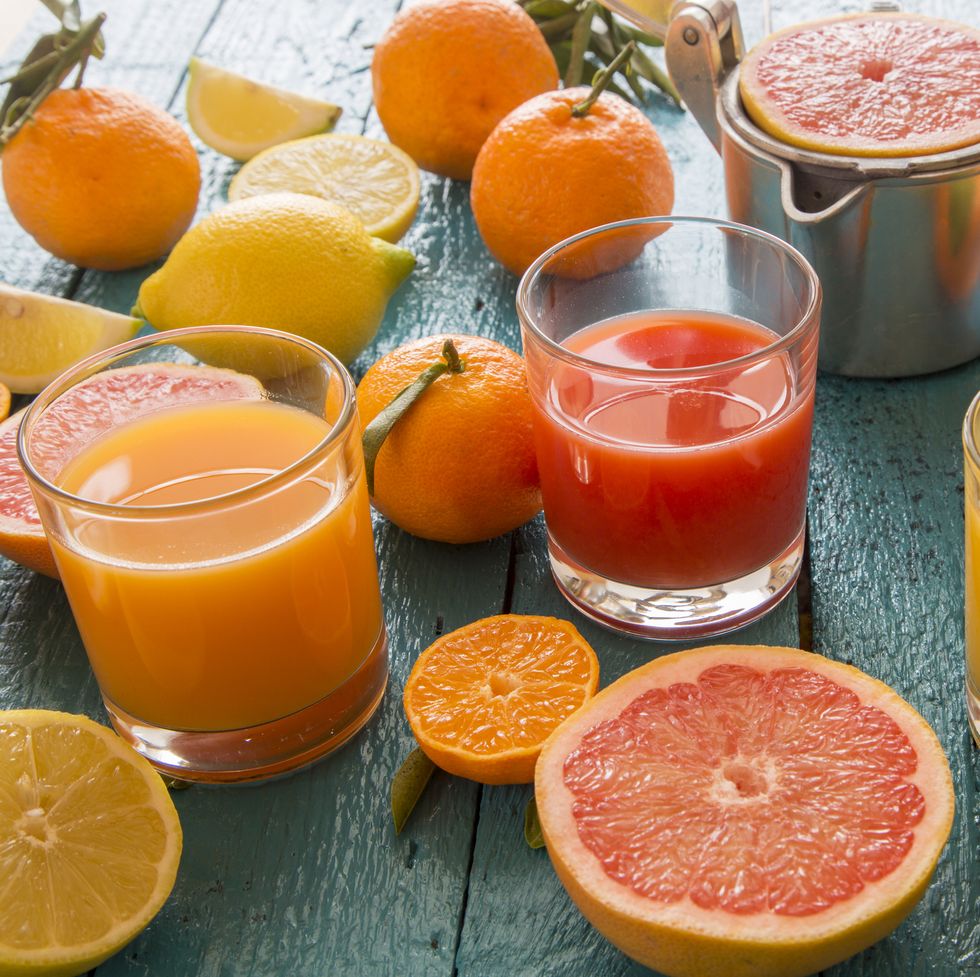Fruit Juice

Juice seems healthier than many beverages, but that’s not always the case. “Some juices contain water and high fructose corn syrup as primary ingredients, with fruit juice concentrates appearing further down the ingredients list,” says Johnson. Even 100 percent fruit juice should be consumed in moderation because an eight-ounce cup can contain up to 37 grams of sugar.
Drinking juice also means you’re missing out on other important dietary components. “Whole fruit, for example, contains less sugar and contains one key nutrient juices leave out: fiber,” says Jason Ewoldt, M.S., R.D.N., with Mayo Clinic.
Alternatives:
- Whole fruits
- Seltzer with a splash of juice
- Juice diluted with 50 percent water
Sweetened Iced Tea

“As with any sugary beverages, sweetened tea means high sugar and high calories,” says Ewoldt. A standard 12-ounce serving of sweet tea can contain 27 to 35 grams of added sugar, which is comparable to some sodas, says Johnson. Even the “less sugar” types often contain five to 17 grams per serving.
Alternatives:
- Unsweetened green or black tea
- Tea with fresh lemon
- Tea with a splash of lemonade
Advertisement – Continue Reading Below
Sugary Coffee Drinks

“Sweetened coffee drinks can have anywhere from 12 to 60 grams of sugar,” says Ewoldt. Sugar sources can include a packet (or multiple) of sugar (four grams of sugar, 16 calories), a pump of flavored syrup (one pump= five grams, 20 calories), and sweetened creamers or half-and-half, which increase saturated fat intake that is associated with higher cholesterol levels, says Johnson.
Alternatives:
- Whole, 2%, or unsweetened plant-based milk instead of sweetened creamers
- Plant-based sweeteners such as stevia or monk fruit
Soda

Just one can of soda contains more added sugar than what is recommended for the entire day, says Ewoldt. In super-sized servings, such as 50-ounce cups, soda could contain 100 to 160 grams of sugar!
What’s more, soda is commonly sweetened with high fructose corn syrup, which has been linked to negative health effects, including fatty liver disease, says Johnson.
Alternatives:
- Seltzer with a splash of juice
- Sodas sweetened with stevia
Advertisement – Continue Reading Below
Sweetened Plant-Based Milk

“Sweetened nut milks tend to have very little fiber or protein, but what they do contain is a fairly moderate amount of sugar,” says Ewoldt. Some types have five to 17 grams of sugar per serving.
The most common types available include almond, cashew, oat, rice, coconut, and soy. “Except for soy, most of these alternatives contain little to no protein compared to dairy milk which provides eight grams of protein per eight-ounce serving,” says Johnson.
Alternatives:
- Unsweetened plant-based milks
- Unsweetened soy milk, which contains no added sugar and protein levels comparable to dairy milk
- Lactose-free dairy milk (if lactose intolerance is the reason for choosing plant-based milk)
Pre-mixed Alcoholic Drinks

“Pre-mixed alcoholic drinks can be a calorie bomb due to the syrups and other sweeteners used to mask the alcohol and make them taste delicious,” says Ewoldt. Some of these drinks may contain 25 to 40 grams of sugar per serving, which is more sugar than a can of soda, says Johnson.
Alternatives:
- Sugar-free premixed alcoholic drinks
- Using fresh fruit or herbs in place of syrups
- Using sparkling water in place of tonic water or sodas
Advertisement – Continue Reading Below
Pre-made Smoothies

“Pre-made smoothies are a good example of taking something that could be nutritious and making it into something of the opposite,” says Ewoldt. Depending on what is used, such as fruit juices, syrups, and sugary yogurt, the result can be high in calories and sugar with little fiber or protein.
Although premade smoothies can be a better choice than a soda or other sugary drink, a single bottle can contain 300 calories and 40 grams of sugar. “Even though this sugar is naturally occurring, the body still metabolizes it the same way as added sugar,” says Johnson.
Alternatives:
- Whole fruit
- Homemade smoothie with less fruit and added protein powder
- Homemade smoothie with plain nonfat Greek yogurt
Pre-made Protein Drinks

These can be helpful for people who want to hit their protein target on the go, and many premade protein beverages actually tend to be lower in sugar because they use calorie-free sweeteners. But you can be more in control of the ingredients by making your own protein shake from protein powder, fruit, and even a serving or two of vegetables, such as spinach, says Ewoldt.
Alternatives:
- Homemade protein shake
Advertisement – Continue Reading Below
Energy Drinks

Many energy drinks contain 30 to 40 grams or more of sugar, per Ewoldt. But that’s not all: They also can contain as much as 300 milligrams of caffeine, which is more than three times the amount in a cup of coffee. “There doesn’t seem to be much positive from a health standpoint in including these options in our daily routine,” says Ewoldt.
Alternatives:
- Coffee without added sugar
- Energy drinks sweetened with plant-based sweeteners
Sports Drinks

A 20-ounce bottle typically contains an average of 270 milligrams of sodium and 30 to 40 grams of sugar. “They are designed to help replace fluids and electrolytes lost through intense sweating,” says Johnson.
These products are made to give the body a quick and efficient source of energy, such as if you are competing in an athletic event or training at high intensities for more than 60 minutes. If you are doing moderate intensity activities for a shorter duration, plain water is your best beverage, says Ewoldt.
Alternatives:
- Water
- Electrolyte packets without added sugar
Watch Next

Advertisement – Continue Reading Below
Advertisement – Continue Reading Below
Advertisement – Continue Reading Below
